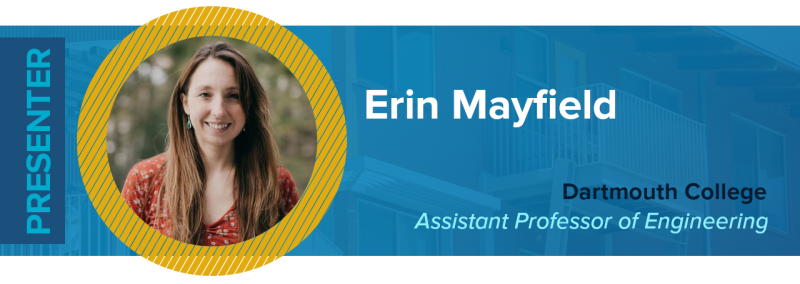Friday, October 31st, 2025 | 10:30 – 11:50am | Location: 1605 Tilia St., Davis CA
Erin Mayfield, Hodgson Family Assistant Professor of Engineering, Dartmouth College
Join via Zoom (passcode: ucdenergy)
Join us for the UC Davis Energy & Efficiency Institute’s Fall 2025 Energy Seminar Series. These weekly Friday morning seminars feature leaders in energy and climate research, providing insights for students, professionals, and the public.
Designing net-zero emissions energy systems to address dynamic societal objectives
Achieving economy-wide net-zero emissions will entail transformational changes in engineered systems. Achieving economy-wide net-zero emissions requires transformational changes across engineered systems in multiple sectors. Central to this transition is the design of future energy and industrial infrastructure that must reconcile the often competing and dynamic priorities of diverse stakeholders.
Macro-energy system models are increasingly employed to guide system planning, typically optimizing for least-cost techno-economic pathways to meet climate targets. However, non-cost factors – such as air quality, national security, and employment – often influence decision-making but are frequently treated as secondary outcomes rather than explicit objectives.
This presentation will examine prospective technological scenarios for infrastructure deployment aimed at reaching net-zero emissions by mid-century. A framework for integrating non-cost objectives into macro-energy system models will be introduced. The approach will be illustrated through case studies including the retirement of coal-fired power plants, natural gas supply chain development, and utility-scale solar project siting.

Erin Mayfield is the Hodgson Family Assistant Professor of Engineering. Her research is in the areas of sustainable systems engineering, public policy, and multi-stakeholder decision-making, with a focus on energy and industrial transitions. Professor Mayfield is a lead author of the Intergovernmental Panel on Climate Change 7th Assessment Report, and has led or participated in several large-scale collaborations on infrastructure transitions, including the Net-Zero America Project, the REPEAT Project, and the Fifth National Climate Assessment.
During the Biden-Harris administration, Mayfield served as a strategic advisor in the Office of Policy at the US Department of Energy and the assistant director in the White House. Mayfield also has several years of experience prior to academia as a practitioner working on natural resource damage negotiation and litigation, including the Deepwater Horizon oil spill, in addition to working with and in disadvantaged communities on hazardous waste remediation and infrastructure planning.
She received her doctoral degree in engineering and public policy from Carnegie Mellon University, masters from Johns Hopkins University, and bachelors from Rutgers University.

